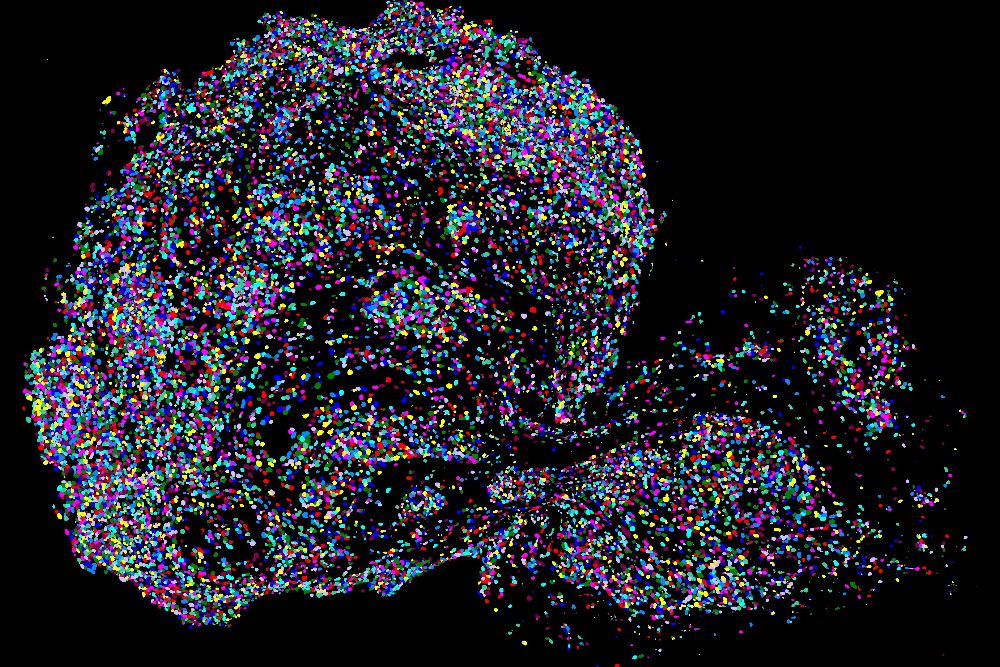
Queen's Art of Research Photo: "Colourful Cells" by Nathalia Yun Kim – This image depicts bladder tissue with Hunner lesion, an inflammatory disease. The image was acquired using imaging mass cytometry, a technology that allows the visual and computational analysis of the spatial distribution of dozens of protein markers on thousands of colourful cells within the tissue.
Bolstering support for research focused on big ideas
Pursuing transformational research can be a long road. To make an impact on addressing major social issues or work towards ground-breaking discoveries researchers need sustained support to fully realize their projects.
Today, the Honourable Randy Boissonnault, Minister of Employment, Workforce Development and Official Languages announced $11.8M in funding for Queen’s from the Natural Sciences and Engineering Research Council’s (NSERC) Discovery and Research Tools and Instruments (RTI) programs. Intended to support ongoing research with long-term goals, the Discovery programs provides multi-year grants that support operating funds and facilitate access to funding from other programs. The RTI grants program supports the purchase of critical research equipment necessary to pursue breakthrough research. The NSERC announcement is part of a larger $960M suite of funding announced by the federal government.
"Our government is funding the top-tier researchers and scientists whose work makes Canada a world leader in research and innovation," says the Honourable Randy Boissonnault, Minister of Employment, Workforce Development and Official Languages. "These projects – from reimagining teacher education with Indigenous wisdom traditions to creating equity in mental health care to researching the impacts of space radiation and weather on Earth’s climate – will help transform today’s ideas into tomorrow’s solutions. This is why Canada is an innovation leader."
In total, 43 Queen’s researchers are recipients of Discovery and RTI program grants as part of today’s announcement. Additionally, in recognition of the challenges the COVID-19 pandemic presented to advancing research, Minister Boissonnault announced a 1-year extension of existing NSERC funds. At Queen’s, 57 researchers will be receiving an additional $2.5M to support their active projects.
The Discovery-funded Queen’s projects:
Subatomic Physics Discovery Grant
Mark Chen (Physics, Engineering Physics, and Astronomy): SNO+ Scintillator Phase and Tellurium Operations (2023-2025) – $2,960,000
Discovery Grant
Biology
Robert Colautti (Biology): The Genetic Basis of Rapid Evolution and Constraints on the Spread of an Invasive Plant – $195,000
Chemistry
Philip Jessop (Chemistry): Chemical Applications of Carbon Dioxide with Water and Amines – $415,000
Lucia Lee (Chemistry): Functional Structures Based on Main-group Supramolecular Interactions – $152,500
Nicholas Mosey (Chemistry): Materials for Energy Applications via Advanced Chemical Simulations – $260,000
Kevin Stamplecoskie (Chemistry): Tailoring the Excited State Properties of Metal Clusters for Photonics Applications – $195,000
Computing
Hesham Elsawy (Computing): Towards Diverse, Intelligent, and Perceptive 6G Network Architecture: Theoretical Foundations and Optimization Schemes – $172,500
Nick Graham (Computing): Fostering Collaboration through Digital Games – $260,000
Ting Hu (Computing): Interpretable and Explainable Learning with Evolutionary Computing – $205,000
David Skillicorn (Computing): Data Analytics in Adversarial Settings – $180,000
Geological Sciences and Geological Engineering
Daniel Layton-Matthews (Geological Sciences and Geological Engineering): Application of Non-Traditional Isotopes at Higher Spatial Resolution to Element Cycling in Mineral Deposits – $175,000
David McLagan (Geological Sciences and Geological Engineering): Seeing the Forest from The Trees: Understanding Pollutant Biogeochemical Cycling Between Vegetation and Air, Fire, Soil, and Water – $187,500
Kinesiology and Health Studies
Brendon Gurd (Kinesiology and Health Studies): Mechanisms Controlling Mitochondrial Biogenesis in Human Skeletal Muscle – $220,000
Mathematics and Statistics
Maria Teresa Chiri (Mathematics and Statistics): Evolution Problems for Moving Sets – $162,500
Felicia Magpantay (Mathematics and Statistics): Transient Dynamics in Deterministic and Stochastic Systems from Eco-Epidemiology – $195,000
James A. Mingo (Mathematics and Statistics): Random Matrices and Higher Order Freeness – $185,000
Psychology
David Hauser (Psychology): How Do Vaccine Resistors Recruit Evidence to Support their Beliefs and Meta-Beliefs? – $202,500
Jonathan Smallwood (Psychology): States of Mind and Brain – Understanding the Neural Basis Behind Different Thought Patterns – $295,000
Sari van Anders (Psychology): Social Neuroendocrinology and the Evolution of Diversity in Human Intimacy – $350,000
Research Tools and Instruments Grant
Christian Muise (Computing): Customizable Platform for Autonomous Agriculture Research – $146,183
Nir Rotenberg (Physics, Engineering Psychics, and Astronomy): Tunable Pulse-Shapers for the Exploration of Dynamic Photon-Photon Interactions – $149,936
To learn more about this round of Discovery Grants, visit the NSERC website. You can also read about Queen’s success in recent SSHRC Partnership and Insight and CFI JELF grants competitions in the Queen's Gazette.
Note: This article originally appeared in the Queen's Gazette.

